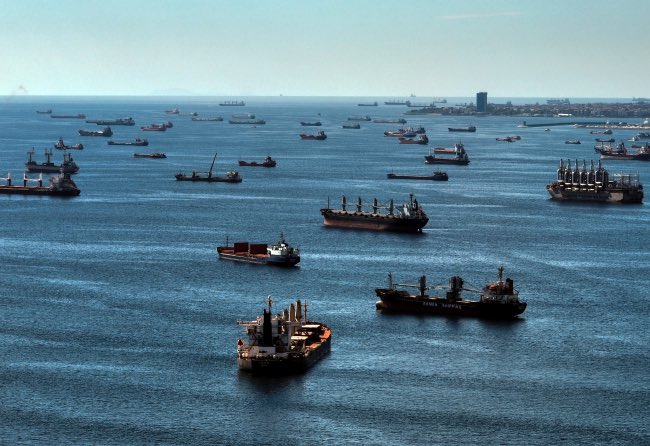Ahmet Yılmaz*
The latest US sanctions imposed on a Turkish businessman were a warning to President Recep Tayyip Erdoğan regarding Turkey’s increasing assistance to Russia and Iran. The US Department of Treasury on Dec. 8 put Sıtkı Ayan, a businessman with close links to Erdoğan, on its sanctions list. Ayan was accused of facilitating the smuggling of Iranian oil to buyers in China and Russia with the backing of senior Russian officials.
Oil and gas are the backbone of the Russian economy. Controlling the global hydrocarbon trade as much as possible is of utmost importance to Russia in order to continue waging its war on Ukraine, and therefore a “center of gravity” in military terms. Russia probably tried to use sanctioned Iranian oil as a tool to strengthen its position in the global oil market with the help of a businessman from the inner circle of Erdoğan, the president of a NATO member country.
EU and G7 sanctions have focused more on this center of gravity and attempted to curb Russian revenue from hydrocarbons, imposing a price cap of $60 per barrel on Russian seaborne crude. As of Dec. 5, no Western shipping services would be available for the Russian oil trade unless the oil was sold at the enforced low price.
However, Turkey on Dec. 2 started blocking some crude oil tankers from passage through the Bosporus and Dardanelles Straits under the pretext of navigational safety, thus disrupting oil trade from the Black Sea. The regulation went into force just three days before the Western price cap came into effect. This “coincidence” even sparked rumors that the Western sanctions themself had caused the oil trade disruption. But that was not the case. Some 30 oil tankers were awaiting passage on Dec. 11. Interestingly, most of them were not carrying Russian but Kazakh oil, which is not under any sanctions and goes mostly to the EU. Oil in Kazakhstan is extracted and marketed for the most part by Western oil companies in partnership with state-run KazMunayGas. Therefore, the situation caused by Turkish authorities was not a problem for Russia, but for the West. It was as if Turkey had started to impose sanctions on the West before the West attempted to impose them on Russia.
The Turkish Maritime Authority started requesting a letter of confirmation from the oil tankers that they would be insured in all circumstances during passage through the Turkish straits. Western insurance companies, by whom Kazakh oil is insured, stated that such a confirmation letter could not and should not be provided to Turkey because there was always a possibility that the cargo could be classified as sanctioned. This could be due to an intentional or unintentional breach of current EU/G7 sanctions before and after passage through Turkish waters, so providing a letter of confirmation beforehand that coverage would be always assured was not possible. Hence, the tankers insured by the Western companies could not provide Turkish authorities with a confirmation letter, and they were not allowed to transit the straits into the Mediterranean. On the other hand, Russian shipping insured by Russian firms was immune from such obstacles. Thus, tankers carrying Russian oil were not blocked from passage by the Turkish authorities.
Representatives of insurance companies accompanied by officials from the US, UK and EU sought to resolve the issue through negotiation and further discussions with the relevant Turkish authorities on Dec. 5. Moreover, Turkey started meetings in Ankara on Dec. 8 with Russian representatives on energy. On the same day, US Treasury Secretary Janet Yellen told reporters sarcastically that the Biden administration had no reason to believe the Russian government was involved in Turkey’s decision to block tankers from transiting to the Mediterranean. And again on Dec. 8 came the decision of the US Treasury to designate Erdoğan confidant and businessman Ayan on its sanctions list. The US had seemingly wanted to play the Ayan card later because all the other people accused of facilitating the smuggling of Iranian oil, other than Ayan, faced sanctions in May. He was the only one left.
Eventually, Erdoğan on Dec. 12 stepped back as he has done many times in similar situations and allowed oil tankers bound for the EU to transit the straits. The Turkish Maritime Authority reportedly accepted a letter from the insurance companies which indicated that insurers would not bear liability in all circumstances. But in the long run, Erdoğan seems to be continuing to support Russia and Iran, sometimes directly but sometimes indirectly and covertly. His meeting with the Gazprom CEO the day after sanctions were imposed on Ayan and his phone conversation with Russian President Vladimir Putin on energy issues on Dec. 11 give concrete clues about that. He had long ago made his irreversible choice to participate into the league of corrupt authoritarian regimes, and Turkey cannot reverse this course unless the Erdoğan government falls from power.
*Ahmet Yılmaz has a master’s degree in international security strategies. He is using a pseudonym out of security concerns.



